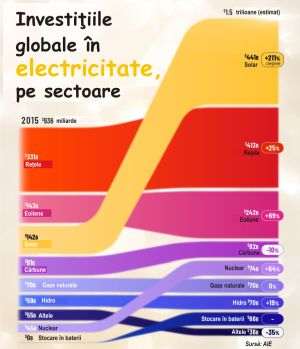Reporter: Is the tense situation between Ukraine and Russia a threat to Romania's gas supply?
Răzvan Nicolescu: That situation has been a cause for concern for us as well. But I wouldn't say that it represents a major issue, because Romania is prepared to deal with any situation. We have enough domestically produced gas to cover demand, imports are at a low, and the industry has significantly reduced its consumption. According to the latest information that we have from the European Union, it would seem we would not be faced with disruptions of the imports of natural gas from Russia.
Reporter: The situation on the domestic market for natural gas seems to fit the description "fools' joy". Industrial consumption has fallen so much that imports have reached a historic low. This indicates the economy has issues. Also, Romania is a captive to the imports of natural gas from Russia. How would you comment on this situation and what real chances do we have of diversifying the supply sources?
Răzvan Nicolescu: Our analyses concerning the evolution of the market for natural gas indicate that consumption will remain at last year's levels.
No significant drops are forecasted, like it happened in 2013. Maybe just slight increases. These days, you will see that most of the chemical plants are operating at almost peak capacity. Sure, consumption is influenced by the measures for increasing efficiency taken by the industry, where there is more room for retooling and reducing energy intensiveness. Demand also fluctuates according to weather conditions. But for the coming years, we are forecasting an economic increase which will generate a rising demand for natural gas, but which, corroborated with the measure for increasing the efficiency of consumption, will lead to a relatively stable market, close to last year's level.
Furthermore, all the forecasts indicate that starting in 2019-2020, Romania will be producing more natural gas than it's going to consume.
When it comes to diversifying sources, we also have available the Szeged-Arad pipeline, through which imports from Hungary get done. Sure, there could be a matter of is a discussion here on where that gas comes from. A significant portion of it comes from Russia.
Reporter: But at the other end of the Szeged - Arad pipeline it is still Gazprom.
Răzvan Nicolescu: It is true. But I repeat, Romania will be producing more natural gas than it consumes in the not-so-distant future, and its reliance on imports will remain low. What I am seriously concerned with, is the role which we are going to assign to natural gas in our energy consumption mix. We have the Romanian energy strategy up for public debate and we are watching this topic carefully.
Reporter: And what proposals did you receive?
Răzvan Nicolescu: We have received many interesting proposals, which we are going to publish soon. The situation is complex. I would want for gas to be processed in Romania as much as possible, so it can generate greater added value here. Transgaz recently announced that starting in 2016-2017 Romania will interconnect with Hungary, Bulgaria and the Republic of Moldova. Only then will we have interconnections for the import and export of natural gas. That is why we are going to have to decide whether we encourage heating using gas-based thermal plants or using electricity. When establishing the strategy, we need to decide, whether we want to build Units 3 and 4 of Cernavodă and the hydroelectric plant of Tarniţa, when we only consume 8000 MW and we have a total output capacity of approximately 20,000 MW.
Reporter: So in the coming years we are going to continue to rely on internal resources, on the natural gas from the Black Sea and on the controversial shale gas?
Răzvan Nicolescu: There are probably people in the EU that now regret that the EU did not get involved more in the Nabucco project. That pipeline would have truly helped Europe diversify its sources of natural gas. In Romania's case, aside from the projected interconnections, we are also involved in the AGRI project, together with Azerbaijan, Georgia and Hungary. In a few months, we expect to receive the results of the pre-feasibility study to see whether the investment is feasible.
Romania also encourages the new explorations of oil and gas, together with the development of the output of production in the existing fields. I am happy that the National Agency for Mineral Resources will auction off new on- and off-shore perimeters, as well as about the fact that is has begun an analysis to check whether the over 40 holders of oil licenses have honored their investment commitments.
In conclusion, I don't know why we should be so concerned with the diversification of natural gas sources, when we have so many resources here. For natural gas, the estimates are optimistic.
Reporter: The explorations of shale gas starting in Romania are controversial. We have begun this project without a public debate and without thorough prior studies on the risks and benefits. How would you comment?
Răzvan Nicolescu: The exploration phase for shale gas is identical to the one of conventional natural gas. We need to explore to see whether or not we do have gas deposits.
Reporter: You recently said that Romania could and should play a more active part in the European Union and on the regional energy market. Could you provide us with more details?
Răzvan Nicolescu: There are many situations where we aren't "players" in the energy sector. For instance, the common interest projects of the EU and the way in which the funds have been divided for the energy infrastructure.
Reporter: You mean we could have accessed more money?
Răzvan Nicolescu: Yes. And we could have drawn up more projects.
Reporter: When will the energy strategy be ready?
Răzvan Nicolescu: We have over 60 opinions on the energy strategy from all the players in the market. The public debate will comprise several stages. We are working on a concept on what is to be done before the completion of the process, and we are also electing the project's team and assigning the tasks. We may even see an involvement of the World Bank with a team of experts. I estimate that there are chances of a dialog with all the political forces starting in October. The strategy needs to be adopted through political consensus.
Reporter: The natural gas market seems very hard to make more transparent. Why not have all the volumes of natural gas available for the free market auctioned off in a transparent manner, on an exchange? The proposal of the Department for Energy to have only part of the gas volumes be sold transparently, in a centralized and non-discriminatory manner seems risky.
Răzvan Nicolescu: We have made the proposal to have the transparent trading of a quantity of gas set by the ANRE become mandatory. First of all, the producers have the obligation to sell with priority to the population. Forcing them to sell the entire volume of natural gas on the free market, there is the risk of not enough gas being sold on the open market. It is impossible to know from one month to the next how much the population will consume. The volumes get updated monthly. So everything relies on the functioning of the system and of the market, and the solution to have only part of that natural gas to be auctioned off transparently is adequate for the current stage of the market.
Reporter: And why is it so hard to develop a system that works?
Răzvan Nicolescu: It isn't easy, nor is it that hard. We've been going round in circles for ten years. What we have tried to do in the last few weeks was to find a balance between the interest of consumers and that of producers. Everybody wants predictability. We have tried to set up a route for the market. We are sure that we can do more and that we should do more. For instance, we need a revision of the code of the network. I want a clear procedure when it comes to the balancing market for natural gas. These elements are the top priority of the market, but they are not up to the ministry. There are some pillars which the operation of the market depends on that need to be urgently defined. I don't know why this wasn't done so far. This market is very change-averse. Making do has always been the preferred option. That is why we have so many infringement procedures in the energy sector. But the idea is to have a strategy. This is what we are headed towards. We have eliminated any kind of state interference in setting the price for half the market.
Reporter: But major consumers still aren't happy.
Răzvan Nicolescu: They are all upset. Sure, every party has its own interests. From my information, negotiated contracts have been signed between the producers and the major consumers. The interests are divergent, and the market regulator can verify the complaints. In my opinion, the producers need to reach an agreement with the consumers because they can't live without each other.
Reporter: When will we see the first auctions organized by Romgaz in the stock market environment?
Răzvan Nicolescu: I am reviewing this matter.
Reporter: In the market there is talk that Romgaz has chosen to store the natural gas because demand was low. What is the situation?
Răzvan Nicolescu: First of all I want to mention that I want all the operators to achieve their storage obligations. And I intend to ask the ANRE to perform an audit, and if necessary, I will support harsher penalties for the failure to meet those obligations. Secondly, storage can also be a commercial strategy. I don't intend to micro- or macro-manage Romgaz or the other energy companies controlled by the Ministry. I am interested in having a professional management. I don't intend to become the CEO of Romgaz. The executives of the energy companies won't hear anything from me unless they get signals that there are integrity related issues over there.
I want to impose corporate governance rules in companies, but that shouldn't be construed to mean that the majority shareholder has no say when it comes to the strategy of that company. The managers should have freedom when it comes to operational activities, but that should be part of a system and of an agency agreement set by the shareholders. Balanced procedures must be created. There have probably been brutal interventions of the state in the commercial policy of the companies before. I won't go in and tell Romgaz how much natural gas to store. But I do agree that Romgaz should have a clear set of policies for selecting customers and offering discounts. All the companies must have some guidelines for their trading policies.
Reporter: Should these principles be transparent or not?
Răzvan Nicolescu: I am a major supporter of transparency, but Romgaz operates on a competition based-market. Its discount policy should not be known to its competitors.
Reporter: And what is the solution to stop having new cases filed with the National Anti-Corruption Department?
Răzvan Nicolescu: To have this clear policy for selecting the clients and the managers of Romgaz, as well as other executives in the state owned companies to take responsibility for their decisions. The managers shouldn't place the decision on the lap of the ministry and constantly fear the National Anti-Corruption Department. That's what's I am trying to convey to them. They have to be responsible. As long as they know they are honest, what would be the problem?
Reporter: Has anything shocked you as a minister?
Răzvan Nicolescu: No, nothing.
Reporter: Is the situation better or worse than you have imagined?
Răzvan Nicolescu: Six weeks after I have taken over the helm of the Department for Energy, the feeling I get is that there are things that can be done. Everybody was telling me that it was an impossible mission and that it was the end of my career. But I have the feeling that there are things that can be done.
Reporter: We have many infringement procedures. Which one is the most pressing?
Răzvan Nicolescu: We need to quickly resolve the clarifications concerning the unbundling rules in transport operators. But the most complicated case is the one that concerns the transit pipelines for Russian natural gas. For every transit pipeline, the EU states are required to publish, the tariffs and the used and unused capacities. Romania has an old agreement with Gazprom, which precedes the country's accession to the EU. The question is now whether it is the agreement or the European regulations that take precedence. I think that the situation must be discussed between the Russian company, the Romanian partners and the European officials. I think that Gazprom wants to stay on the Romanian market, even though consumption has dropped.
Reporter: What will you be talking about on Thursday and Friday with energy commissioner Oettinger?
Răzvan Nicolescu: There will probably be things concerning the European agenda in the energy sector. I am interested in his vision on the evolution of energy prices on the European market, as well as the support which the EU can grant Romania in order for it to become a regional energy hub. Of course, we will also be talking about the situation in Ukraine and the high number of infringement procedures that our country has in the energy sector.
Reporter: Thank you!
Mirea, CONPIROM:
• "Only three chemical plants are still functional"
Marin Mirea, the vice-president of the confederation of professional associations CONPIROM, yesterday told us that only three chemical plants are still functional and that minister Răzvan Nicolescu is misinformed: "InterAgro has four chemical plants shut down and only two of them are still operational and they will only be so until May 1st. Azomureş is operational, but at a reduced capacity. InterAgro will shut down these plants starting on May 1st if the negotiations with the gas producers fail".
Mr. Mirea also claims that the two gas producers are still clinging to their gas prices and they are sticking with the schedule for raising the prices on the regulated market: "The government has passed an emergency ordinance that stipulates a reference price for the free market. That price is 72 lei/MWh. The producers don't want to negotiate starting from that price. They are inflexible and they are still imposing the rising tariffs used on the regulated market".
The representative of CONPIROM claims that these contracts for supplying natural gas are negotiated monthly and that fertilizer makers need long term contracts. (A.T.)





















































